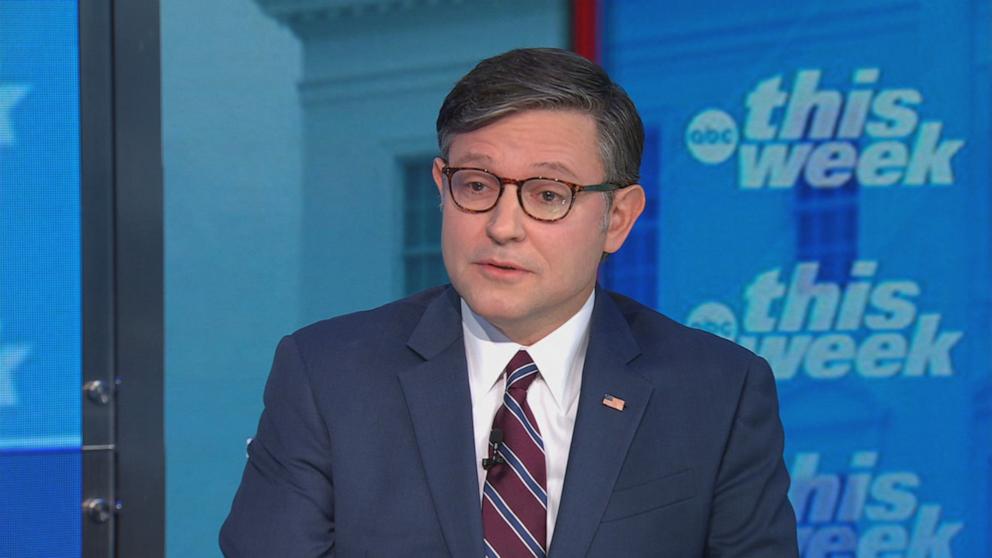House Speaker Mike Johnson is attempting to draw a sharp line between political dissent and what he describes as “destructive rhetoric” after calling nationwide “No Kings” rallies opposing Donald Trump “hate America” events. On Sunday, Johnson argued that his remarks referred to the tone and messaging displayed at the protests, not to Democrats as a whole.
The rallies, held in several major U.S. cities over the weekend, were organized by groups voicing resistance to Trump’s 2024 comeback bid. Participants framed the demonstrations as a warning against authoritarianism and political overreach. Marchers carried signs invoking democracy, free speech and constitutional norms, but conservatives seized on a handful of slogans and chants they viewed as extreme.
During an interview on ABC’s This Week, co-anchor Jonathan Karl challenged Johnson over his characterization of the rallies and questioned whether the speaker was contradicting his earlier calls for unity after the killing of Turning Point USA founder Charlie Kirk.
Karl cited Johnson’s own words in that earlier moment, when the speaker urged Americans to see one another as “fellow countrymen, not enemies.” Johnson defended his consistency, insisting he did not label individual Democrats as anti-American.
“I’ve never called anybody an enemy,” Johnson said. “But there were a lot of hateful messages out there over the weekend.”
Johnson claimed that footage from the protests included explicit calls for violence directed at Trump and his supporters. “We have video and photos of pretty violent rhetoric calling out the president, saying ‘fascists must die’ and all the rest,” he said. “So it’s not about the people, it’s about the message.”
Karl pressed him further, pointing out that Johnson previously invoked anarchists, antifa supporters and pro-Hamas elements while referring to what he called “the modern Democratic Party.” Johnson pushed back on the idea that he was smearing the party’s entire base.
“I never said it was the whole Democratic Party,” Johnson replied. “But you and I have to acknowledge the reality.”
He then pivoted to New York City politics, highlighting Democratic mayoral candidate Zohran Mamdani. “Look at what’s happening in New York,” Johnson said. “They’re about to elect an open socialist Marxist as the mayor of America’s largest city. There’s a rise of Marxism in the Democratic Party. It’s an objective fact, and no one can deny it.”
Mamdani, a state assemblyman and member of the Democratic Socialists of America, has campaigned on housing access, immigrant protections and public transit investment. Though his candidacy has gained traction among progressive voters, it remains unclear whether he has enough support to win a citywide general election. Johnson used Mamdani’s platform to argue that the political left is moving farther from the traditional center-left identity most Democrats have embraced for decades.
Republicans have been increasingly vocal about protest language they say goes beyond criticism of Trump’s policies and edges into outright hostility toward the country. Over the weekend, conservative commentators circulated photos of signs featuring slogans like “No kings, no fascists” and “End imperial rule.” Some of those images included harsher language, which Johnson and other GOP leaders point to as justification for strong pushback.
Organizers of the “No Kings” demonstrations responded by dismissing those claims as selective outrage, arguing that the majority of participants were peaceful and focused on democratic messaging. They compared the protests to anti-war demonstrations and civil rights marches, where dissent has historically been conflated with disloyalty.
Johnson, however, maintained that rhetoric encouraging violence or implying the destruction of American institutions is not a partisan issue but a national one. “There is a difference between expressing disagreement and calling for the downfall of this country,” he said. “When you cross that line, it’s fair to call it out.”
Democrats are divided in their response. Some have accused Johnson of using a few isolated images to brand a broad movement of Trump critics as extremists. Others have tried to walk a careful line, condemning violent slogans while defending the right to protest a former president currently under multiple federal and state indictments.
Johnson’s comments underscore ongoing partisan battles over political expression during an increasingly contentious election season. Trump’s legal challenges, along with debates over immigration, foreign policy, the economy and voting rights, have sharpened tensions between the parties’ bases. Republicans have leaned into claims that the left has become radicalized, while Democrats argue that conservative leaders are silencing dissent by labeling it unpatriotic.
Despite the scrutiny, Johnson did not back away from his characterization of the weekend rallies. Instead, he insisted his remarks were being misrepresented. “You can disagree with the president all day. That’s your right,” he said. “But if you’re chanting for violence or portraying America as the enemy, I’m going to call that what it is.”
For now, the speaker’s comments are driving headlines and sharpening divides over what constitutes legitimate protest versus extremist messaging. With the 2024 election cycle accelerating and public demonstrations expected to continue, debates over tone, rhetoric and responsibility appear likely to intensify.

